Editorials and Articles Archive
Allen's Wrench
How Kris Allen broke American Idol, and why we may all be better off for it.
25 May 2009
Let's get one thing straight up front: it wasn't an upset. Oh sure, it might have been a surprise, particularly to the insular media types who anointed Adam Lambert and Danny Gokey the nation's favorites primarly because they lined up in a circle and quoted one another for three solid months. It might have been a jolt, particularly to the American Idol producers who thought they had the entire season scripted to perfection until a pair of upstart nobodies proceeded to rip out and tear up the last 11 chapters in front of 25 million weekly witnesses. It may have been a disappointment, particularly to Lambert's legions of red-Hot fans (the capitalization carries portent; we'll explain, we'll explain) who believe that the best pure vocalist deserved the confetti.
But an upset? Hardly. An upset implies that a weaker competitor happened to beat a field of stronger ones. Kris Allen's wild, remarkable, highly deserving ride to victory in Season Eight was anything but that. Rewind the competition to the beginning and re-run it fair and square this time, and Allen would probably win again. And again, and again. That's because he came out on top for all the right reasons: brilliant song selection, solid vocals, superb presentation (his penchant for side-mouth singing notwithstanding), and most importantly, by crafting a strategy to sell himself to America that was so intelligent that it's worth paying him the highest compliment in the Idol analysts' lexicon. It was Cookesque.
This is not to say that Allen didn't have some good fortune on his side. On the contrary, he and Lady Luck sang a three-month duet from the earliest Semifinals episode right down to the last song (or reasonable facsimile thereof) of the Finale. Except this time, Allen's partner didn't flub any of her lines, and she knew how to share the stage and make eye contact. (In contrast, the bad karma that befell the hapless Lambert in the last two episodes was almost painful to watch, even if you weren't a fan.) Nonetheless, Allen needed all that providence and more just to overcome the handicap he and 20 other semifinalists had been saddled with: The producers wanted them out of the competition so badly that they used everything they could get their hands on to get rid of them, short of poison blow darts. And come to think of it, is Ju'Not Joyner 100% certain that was a cortisone shot he'd been given?
In the end, Allen threw the biggest monkey wrench into the Idol Machinery that any of us have ever seen. He made Taylor Hicks's victory look preordained. The outcome spawned an epidemic of hand-wringing in many quarters, some of which reached levels of silliness that almost defy belief. (Our "favorite", so to speak: an industry blogger suggested Lambert's runner-up finish was a disaster for American Idol in part because so many TV celebrities were publicly rooting for him, and now the show would never win any major Emmy awards!)
To all the naysayers, we say: rubbish. Whether you were rooting for the unassuming Arkansan or not, and even if his debut album sells exactly nine copies worldwide while Lambert's goes nonuple-platinum, his victory was the best thing that could possibly have happened to the franchise. It delivered a jolt to a fading show, invigorated an Idolsphere that had (ourselves included) grown jaded and weary, and gave tens of thousands of potential auditioners new hope that cleverness and musicianship were indeed more valuable than favorable test-marketing and producers' manipulation.
Still, before we fully cover the many implications of Allen's victory, we really ought to stop and answer the one question on everyone's mind: How in hell did he do that??!
Hot And Cold
To illustrate how we believe Allen caught and overtook both Gokey and Lambert, we're going to put our web approval ratings to an unusual task. We're going to use them to try to construct how the voters perceived each contestant as the competition progressed, based on their respective performance histories. Essentially, we'll try to model what percentage of the country were inclined to vote for (or against) the three men, week by week.
We'll state cheerfully in advance that this entire process is one big honking experiment. As we cannot stress enough, WhatNotToSing.com ratings were never designed to be a voting prediction system. They're a statistical measure of how well a performance was liked by Internet reviewers, nothing more and nothing less. Unlike at Camp Should-A-Been, way too many outside factors go into the typical voter's decision-making process. However, we know from years of crunching numbers that performance quality is the most important voting factor by a substantial margin. So, we'll take that and run with it as best we can.
To start, we're going to assume that for each contestant the Idol electorate can be divided into four basic groups.
- Hot ...represents the percentage of voters who are fully on board this contestant's bandwagon. Consider them his or her core fanbase, with some small percentage of this group being true power voters.
- Warm ...represents those who are positively inclined towards a contestant, but who aren't necessarily whole-hog into them. They include casual voters who may throw them some votes if they're so motivated (though exactly what motivates them is anyone's guess.)
- Mild ...represents voters who are neutral towards a contestant, harboring neither great love nor great hate. They can be swayed either way as the season progresses.
- Cold ...represents voters who detest a contestant with the fire of a thousand suns, or at least a pocketful of butane lighters. Early on, they pose no real threat to an Idol, but as the field narrows the possibility of "spite votes" against him or her becomes very real.
In colloquial Idol jargon, we might label these categories Lurve–Like–Meh–Die. Obviously, a contestant wants a fanbase as hot as possible, but 100% BTU efficiency is impossible (particularly here in the Second Epoch, where the AI viewership is so much more diverse.) In any given week, a contestant has done his job if he moves a modest percentage of the electorate to the next warmer category while minimizing the number who grow cooler towards him. Over time, however, voters will naturally gravitate towards one extreme or the other as they make up their minds about each singer.
So how will we measure these Inclination Groups, to coin a term? We'll start with a carefully calculated, scalpel-precise measurement of where the three guys stood coming out of Hollywood. (Read: we'll take a wild guess, but hopefully a reasonable one.) Then we'll fold in the results of their weekly performances, weighing recent ones more heavily than ancient ones. As we do this, you'll see in our trademark Colorful Charts how we think the fanbases evolved, and exactly where and when Allen made his charge.
(If you have the slightest curiosity about how the underlying math works, read this paragraph, otherwise just skip it because it's really not important. Here at WNTS, our engine gives us two main levers to work with: one labeled "approval rating", and one "standard deviation". Thus, for each contestant, we calculate a weighted rating and a weighted sigma week by week. Ratings are simple; we take 80% of the previous rating plus 20% of the latest one, choosing those values because They Seemed About Right. For standard deviations, we do much the same except we arrange it so that the overall s.d. tends to grow from week to week as voters make up their minds. This leaves us with a bell curve that gets progressively lower and wider as the weeks progress. Finally, we see what percentage of each curve exceeds certain thresholds: above 90 for "Hot", 60-90 for "Warm", and below 30 for "Cold". As with weights, we chose those numbers on the T.S.A.R. principle. Having explained all this, please don't put too much stock into the arbitrary parameters we used – concentrate instead on the relative movements within each of the three fanbases.)
Hooray For Hollywood
There's little doubt that Gokey was the front-runner by a Wisconsin mile coming out of Hollywood. His poignant backstory had captured America's attention, though the manner in which the producers had exploited it came off as distasteful to some. When Gokey was advanced to the Top 36 while his good pal Jamar Rogers fell short, his fans' heartstrings were tugged even further. (Which, ahem, is why we suspect Rogers was dismissed when he was. The producers were furthering their scripted theme of Danny Gokey Persevering Alone Courageously After A Loss. And, if you believe that we're being too cynical and that no TV production staff could possibly be that tacky, insensitive and shameless in the face of the tragedy that the young widower had already endured, then you must have just tuned in to this show.) All that said, Gokey had sung impressively at every stage, giving his newfound fans no reason to doubt his prowess.
Lambert, meanwhile, had been granted less screen time than Gokey, but considerably more than most other contestants. Our staff considered him, we admit, a marginal advancee to the second round after his Bohemian Rhapsody audition. He was miles more impressive in his Hollywood group performance, shining brightly on Some Kind Of Wonderful. (His video montage also featured Michael Sarver, Matt Brietzke, and a certain administrative assistant from Minnesota whose name we will not mention here because the wounds from her Wild Card dismissal are still festering.) He kicked off the final Hollywood round with an unusual reworking of Cher's "Believe". Taken together, Lambert's stunning vocals seem to have won over a lot of viewers early, but the theatre-style performances turned off quite a few as well. Business as usual for The Glambert.
Allen's four-second audition snippet couldn't have won him many fans, particularly since about half of the brief video focused on Kara's reaction. More helpful was his exposure in White Chocolate, whose performance of I Want You Back was the highlight of the Hollywood Group episode. The clip was surely meant to spotlight Matt Giraud, and the producers were no doubt delighted that Giraud's three unpromoted groupmates, including India Morrison and Justin Williams, pitched in strongly to produce a memorable moment for him. All things considered, Allen came out of the semifinals as perhaps a quarter-step above a blank slate.
Before we move on, let's take a closer look at the White Chocolate clip. In many ways, it was a microcosm of all that went wrong for the producers in Season Eight, and all that went right for Allen. Recall that the abysmal episode featured precisely five minutes of on-stage singing (our junior editor pulled out the DVD and painstakingly clocked it), stretched out to fill a 60-minute time slot. Seems that 19E believed that America was far more interested in watching the New Adventures of Bikini Girl and various other backstage pissing contests. Only one other group performance was even close to being aired in full (Gokey's), with the rest being covered via montages and cut shots. Thus, White Chocolate stood out even moreso than it would in a normal year: a minute to remember amidst an hour to forget.
When Allen finally started drilling his way into the public consciousness a few weeks later, millions of viewers were left wondering, "Where'd this guy come from?" Web searches would lead them to the one and only significant early airtime he'd been awarded. "Oh yeah, White Chocolate – I remember them, they were awesome!" In short, the producers' scheme backfired on them that night: they chose to emphasize the dramatic rather than the melodic, and in the process they ended up inadvertently showcasing a contestant who was not on their short list of front-runners. They would repeat this blunder several times before the season was through.
By the end of the Hollywood rounds, a mild anti-Gokey backlash had already materialized on the Web, though early on the producers were bearing more the brunt of it than Gokey himself. Not long later, photos of the sexually ambiguous Lambert kissing a man began to circulate across the Internet. We're going to consider both of these incidents, plus a few minor ones as well, as being part and parcel of the "Pre-Semifinals" phase. (Why? Because regardless of when they took place, they were peripheral to the actual singing competition itself. At this point, we're trying to estimate the contestants' impression on the voters excluding any actual competitive performances they'd given. Chronology is overrated, anyway.)
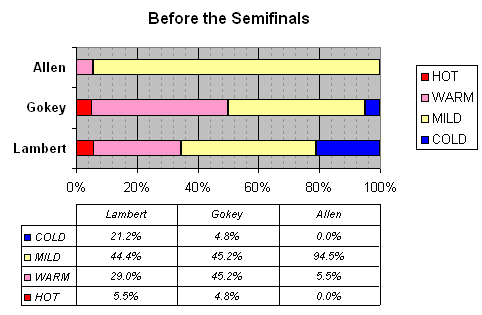
The chart above shows our assessment as to where the Final Three stood at this early stage. Each colored segment represents what percentage of the electorate fell into each of the four Inclination Groups. Red and pink are good, blue is bad, and beige is neutral. Note that we have Gokey and Lambert with roughly equal Hot segments, but Gokey has a far wider Warm group while Lambert had to deal with a serious Cold front. Hollywood was officially over – now it was time to get real.
The Semifinals
Gokey sang first, closing the Group One episode with Hero and earning an excellent 79 approval rating from web reviewers. His standard deviation was a low 15. We'll represent this as 79/15 moving forward. This would turn out to be Gokey's high-water mark for the season, but at the time it only expanded and solidified his fanbase
Allen and Lambert sang the following week in Group Two. Here again, Allen caught an unwitting break from the producers when many of his heavily-promoted rivals fell flat on their faces. Allen's 63/20 for Man In The Mirror was just good enough to advance, and it permitted him to begin building a rudimentary fanbase. Lambert ended the night with a last-minute song selection, The Rolling Stones's classic Satisfaction, on which he took quite a few liberties with the melody, such as it is. That led to a monster 28 s.d., to go along with a 65 rating.
After crunching the numbers, here's where we think the three men stood after one performance. Gokey and Lambert each had about 10% of the voting public solidly in their corner. The difference: Gokey's extended family covered almost three-fifths of the voters, compared to two-fifths for Lambert. Allen still trailed, though he'd at least given about one-third of the country a reason to view him favorably.
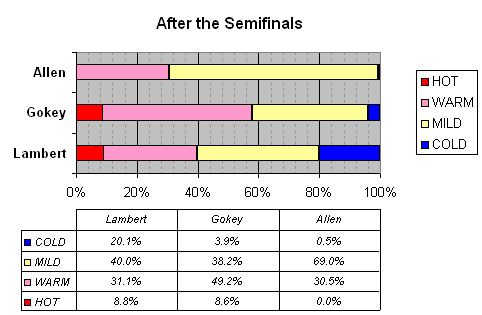
The Early Finals
Michael Jackson Night is remembered around the WNTS offices for producing two of the 20 most love-it-or-hate-it performances ever: Lambert's 5-star Black Or White (81/29) along with Megan Joy's bizarre, ornithologically incorrect Rockin' Robin. Quietly as usual, however, Allen also had an important performance. By choosing MJ's unusual, jazzier Remember The Time and busting out his guitar for the first time, he garnered a very high sigma of 24 along with a decent 56 rating. Curiously, this was a case in which a somewhat polarizing performance was a clear boon to a contestant, because Allen dearly needed to make a splash – note that he gained his first sliver of a Hot segment. Gokey, meanwhile, turned in his second-straight 4-star performance with P.Y.T. (72/21), marking what we believe was the peak of his fanbase.
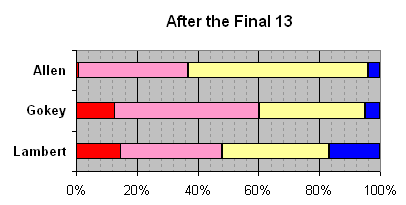
The war still rages around the Idolsphere as to whether Ring Of Fire was a showstopping masterpiece or a complete train wreck. (Don't ask us; we're still arguing about it too. -Ed.) Two months later, we'd say it was the performance that catupulted him into the national spotlight, while at the same time was the albatross around his neck that he could never quite shake. From a fanbase perspective, however, Lambert's Grand Ole Opry Night effort (51/35) probably wasn't as significant as you think. The reason: by this point in the season his performances had already been so polarizing that one more in that vein couldn't make that big of a difference. Allen, again working in the shadows, turned in his highest-rated performance thus far on To Make You Feel My Love (76/20), while Gokey's Jesus Take The Wheel (58/22) had its fans and detractors.
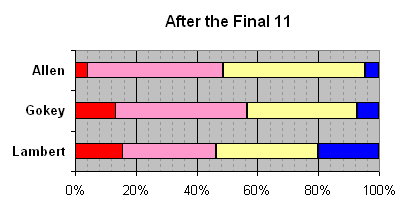
Lambert was again the feature act on Motown Night thanks to the brilliant The Tracks Of My Tears (85/22; we think that the high standard deviation was mainly a vestige from the previous week.) Allen remained in 4-star territory with How Sweet It Is (68/15), while Gokey's slow rating slide continued with Get Ready (54/19). By now, we'd say that Allen had pulled virtually even with the two front-runners in terms of favorable opinions, but he still lagged well behind both on the number of Hot voters.
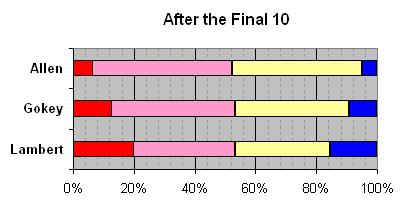
That all began to change the following week. The Final Nine's Top iTunes Downloads Night was noteworthy for a string of horrendous song selections by the contestants. Lambert's choice, Play That Funky Music (69/23), was another last-minute substitution that worked out well with the Idolsphere all things considered, while Gokey mostly treaded water with What Hurts The Most (55/20). The evening was well on its way to being one of the lowest-rated Finals episodes in our database when Allen, in his first and only producer-granted pimp spot of the season, shone on Ain't No Sunshine (85/9). Again, Allen caught a bit of a break: his first 5-star performance came on a night in which viewers were starving for something good.
So where did they stand as we move to the midsection of the season? Here's our guess:
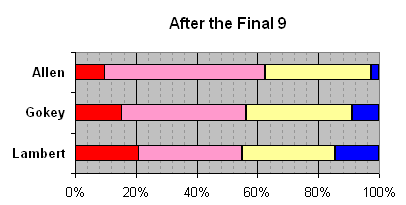
If Hot fanbases are all matter (and to the producers, that's probably the case), then the pecking order was clearly Lambert – Gokey – Allen. In terms of overall favorable views, however, we'd say that Allen had already taken the lead, and that this development came far earlier than any published report we've seen. Allen also had the benefit of a much smaller Cold group that could cause trouble for him down the road. Surprised?
This would be a good time to mention yet again that our rating system is not to be mistaken for an accurate vote-prediction model. Those red and pink bands measure what amounts to potential energy, but turning them into actual "Thank you for voting for contestant X!" messages from AT&T is another matter entirely. Our guess is because Allen got such a late start, he was still trailing significantly in the balloting at this juncture. "Hot" fanbases would seem to continue voting for their favorites, even when they are on a clear downslope in their ratings. Inertia and natural competitors surely play a role, as does a line of reasoning such as, "If I start power-voting for Kris now, I would have wasted all those hours I spent hitting redial for Danny!" But, it does show that Allen was far from the "upset" winner that the media portrayed him to be. He had been running with the big dogs for many weeks.
[ Concluded in Part II of "Allen's Wrench" ]
- The WNTS.com Team

